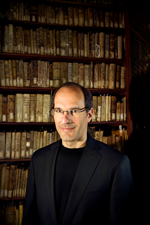
David Nirenberg is Deborah R. and Edgar D. Jannotta Professor of Medieval History and Social Thought at the University of Chicago, and the director of the university’s Neubauer Collegium for Culture and Society.
Much of his research focuses on the ways in which Jewish, Christian, and Islamic societies have interacted with and thought about each other. His first book on this subject, Communities of Violence: Persecution of Minorities in the Middle Ages (1996), proposed new ways of thinking about the function of violence in interfaith relations. More recently in Anti-Judaism: The Western Tradition (2013), he traced the multiple ways in which thinking about Jews and Judaism has shaped Christian, Islamic, and modern secular thought. His Neighboring Faiths. Christianity, Islam, and Judaism in the Middle Ages and Today, recently published book in 2014, suggests that the three religions have always been, and continue to be, “co-produced,” constantly re-shaping themselves by thinking about and interacting with the others.
He has also written extensively on other subjects, including love, set theory, poetry, painting, and politics. A contributor to publications such as The Nation, The New Republic, and The London Review of Books, he is currently collaborating with a mathematician (his father) on a book exploring the relative claims of different forms of knowledge, in the hope of (among other things) discovering new ways of understand both the powers and the limits of the sciences and the humanities.